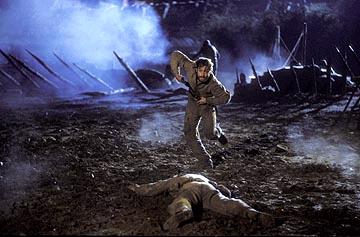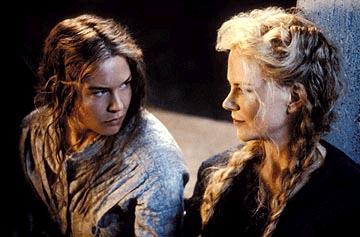

The Civil War is slowly coming to a close, and Inman dreams of returning home to Cold Mountain, North Carolina, where Ada Monroe waits for him. It's been a few years since they last laid eyes on each other, and what began as potential love is now a deep-rooted need and desire for one another. These themes of love, along with those of hatred and war are exactly what director Anthony Minghella (The Talented Mr. Ripley, The English Patient) always finds himself drawn to. Here, he adapts Charles Frazier's Cold Mountain, a National Book Award winner and fan favorite. The core of Cold Mountain is a love story that is not quite there, gutting some of the rest of the film, which is told from two points of view. Inman (Jude Law, Road to Perdition, A.I.), a Confederate soldier, decides to desert and travel home, while at Cold Mountain, Ada (Nicole Kidman, The Human Stain, The Hours) tries to survive living on a farm.
Inman's journey is more compelling. He is going through his own Odyssey, trying to hide from locals who are apt to shoot deserters and meeting all sorts of characters (which translates to a slew of big name actors in small roles) along the way. At the core of the film is the love between Ada and Inman. The hard part in dealing with this is that they were never really in love to begin with. The war started before anything substantial could happen. Minghella portrays their desire for one another as something deep, almost primal. They know they need each other, and their mutual need is what drives Cold Mountain forward. Inman's love of Ada is almost all that keeps him alive. He slogs forward with severe injuries, relying on the kindness of strangers to point the way home.
Ada is in a similarly tenuous position. She was raised in Charleston, but her father (Donald Sutherland, The Italian Job, Final Fantasy: The Spirits Within) moved out to Cold Mountain for his health, but died, leaving Ada to tend to a farm that she knows nothing about. She is a city girl with absolutely no knowledge of the country, too proud to accept help from her neighbor Sally Swanger (Kathy Baker, Assassination Tango, The Glass House). Salvation comes in the form of Ruby (Renee Zellweger, Down With Love, Chicago), a headstrong woman who is Ada's opposite in nearly every way. Her father abandoned her as a child, forcing her to learn everything she could. She is headstrong, crass, and agrees to help Ada with the farm only if Ada treats her as an equal.
One of the reasons for the novel's popularity was how it idealized Cold Mountain and the surrounding region. Inman longed for both Ada and his home. Minghella was able to find beautiful surroundings not in North Carolina, but in Romania of all places. He successfully translates Frazier's words onto the screen, with lush, rolling hills and beautiful surroundings. Cold Mountain is paradise, so much more so than where Inman currently is. Minghella focuses up close on the battle scenes, showing how cramped and chaotic the environs are. Every director these days wants to show the audience that war is hell, but Minghella clearly conveys Inman's sense of horror at everything happening around him. It only makes sense that Minghella has so much time to focus on the surroundings. They play an important part in the development of the characters, and there is so little screen time where Law and Kidman are together.
This is Cold Mountain's main weakness. How can there be a love story when the two people are almost never together? Flashbacks where Ada and Inman are together help establish the story, but one needs more. The separation, especially long given the running time, begins to drag near the middle of the film. Law stumbles his way through the film, as he should, given the state of his character. All of the people he meets, including Philip Seymour Hoffman, Natalie Portman, Melora Walters, Eileen Atkins, Jena Malone, Giovanni Ribisi, and others outshine him because they have so much personality. On the other hand, they are one-note characters who are on screen for sometimes minutes before moving on. Zellweger's purpose is for comic relief, and again, it falls upon Kidman to anchor the film. And she does. Kidman again, is absolutely riveting. Ada at the beginning of the film, when by herself, is timid, scared, and unsure of herself. Kidman's appearance is disheveled, and her actions match. As Ruby appears and begins teaching Ada, Kidman's performance changes to match Ada's newfound knowledge and sense of independence. She is more sure of herself, stands taller, and the color returns to her face. At the end of the film, she is planting crops and firing rifles with determination. She has found the home that Inman is longing for. Kidman is mesmerizing to watch, again proving why she earned a well-deserved Academy Award last year, and at the very least, deserves another nomination this year.